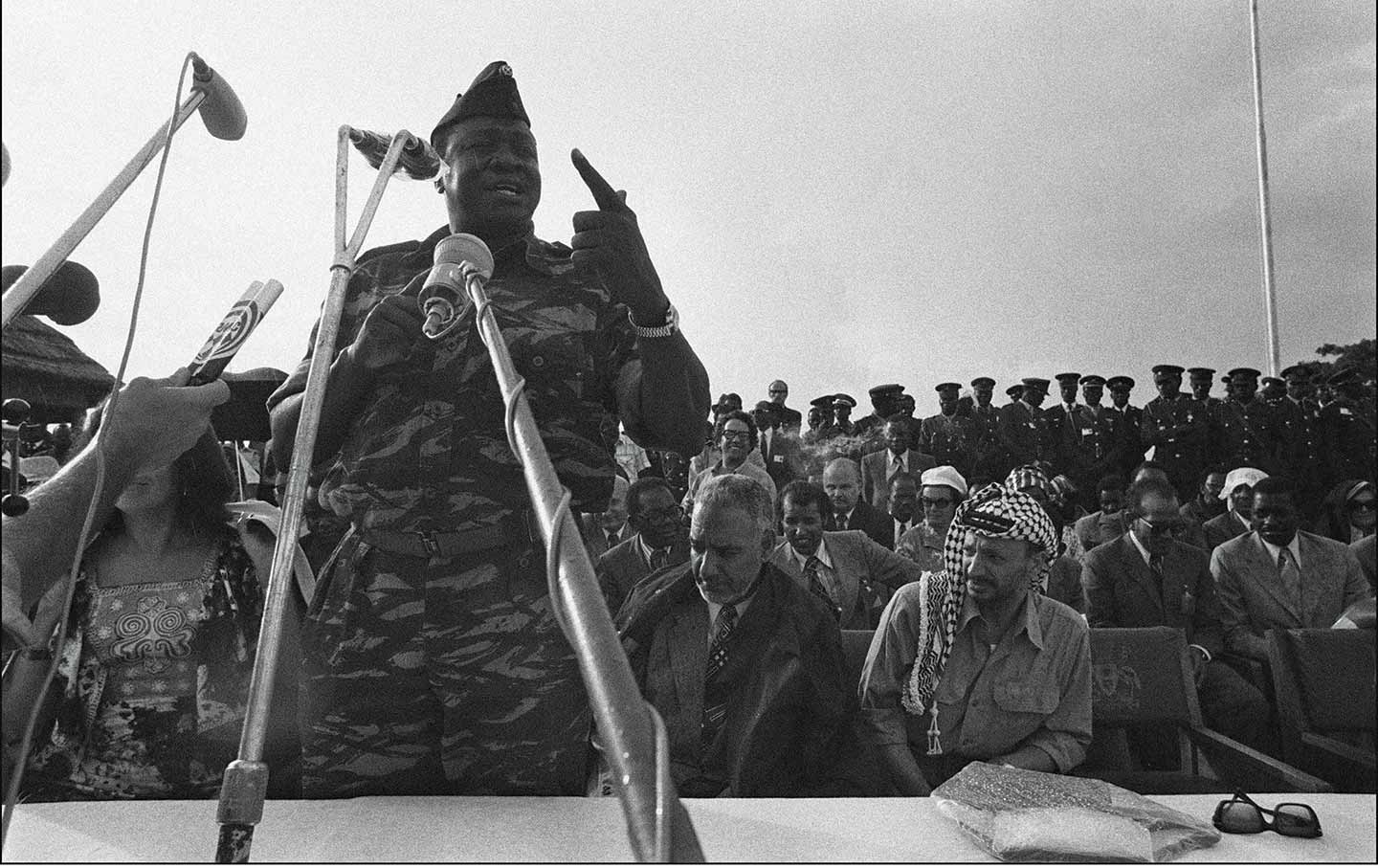
Benjamin Netanyahu in Jerusalem on February 5, 2024.
(Gil Cohen-Magen / Pool /AFP via Getty Images)The American decision not to veto a UN Security Council resolution demanding an immediate cease-fire in Gaza—the first time since the beginning of the war that it had allowed such a resolution to pass—sent shock waves through Israel. Benjamin Netanyahu’s subsequent cancellation of a planned Israeli meeting with the Biden government in Washington only heightened the impression that Israel had been left isolated in the international arena and that Netanyahu was jeopardizing the country’s most important asset—its alliance with the United States.
Yet, though there was widespread criticism of Netanyahu’s handling of these sensitive issues, even his opponents—both in the “liberal” camp and on the moderate right—were unanimous in their rejection of the UN vote. Yair Lapid, head of the opposition Yesh Atid party, said that the resolution was “dangerous, unfair, and Israel will not accept it.” Minister Hili Tropper, a close ally of Netanyahu’s rival Benny Gantz—who polls show would win handily if an election were held today—said, “The war must not stop.” These comments did not differ greatly from the angry reactions by extreme-right leaders such as Bezalel Smotrich or Itamar Ben Gvir.
This near-unanimous rejection of a cease-fire mirrors the cross-party support for an invasion of Rafah, even though Netanyahu does not claim that the operation will achieve the long-awaited “total victory he has promised.
The opposition to a cease-fire may seem strange to some. Many Israelis accept the claim that Netanyahu is continuing the war to further his political and personal interests. The families of the Israeli hostages, for instance, are growing more critical of Netanyahu’s “foot-dragging” and amplifying their calls for a “deal now.”.
Even within the security establishment, more people are openly saying that “eliminating Hamas” is not an achievable goal. “[T]o say that one day there will be a complete victory in Gaza—this is a complete lie,” former IDF spokesman Ronen Manelis recently said. “Israel cannot completely eliminate Hamas in an operation that lasts only a few months.”
So if the view that Netanyahu is continuing the war for personal interests is growing; if the futility of continuing the war is becoming clearer, with regard to both toppling Hamas and releasing the hostages; if it is becoming obvious that continuing the war is liable to damage relations with the United States—how can one explain the consensus in Israel around the “danger” of a cease-fire?
One explanation is the trauma inflicted by Hamas’s October 7 massacre. Many Israelis tell themselves that, as long as Hamas exists and commands popular support, there is no alternative to war. A second explanation involves Netanyahu’s undeniable rhetorical talent, which, despite his political weakness, has succeeded in instilling the slogan of “total victory” even among those who do not believe a word he speaks, and those who understand, consciously or unconsciously, that this victory is not possible.
But there is another explanation. Until October 6, the consensus among the Jewish-Israeli public was that the “Palestinian issue” should not bother them too much. October 7 shattered this myth. The “Palestinian issue” returned, in full, bloody force, to the agenda.
There were two ostensible responses to the destruction of this status quo: a political arrangement that genuinely recognized the presence of another people in this land and their right to a life of dignity and freedom, or a war of extinction against the enemy beyond the wall. The Jewish public, which never really internalized the first option, chose the second.
In this light, the very idea of a cease-fire seems threatening. It would force the Jewish public to recognize that the goals presented by Netanyahu and the army—”toppling Hamas” and releasing the hostages through military pressure—were simply unrealistic. The public would have to concede what may be perceived as a failure, even a defeat, in the face of Hamas. After the trauma and humiliation of October 7, it is hard for many to swallow such a defeat.
But there is a deeper threat. A cease-fire could force the Jewish public to confront more fundamental questions. If the status quo does not work, and a constant war with the Palestinians cannot achieve the desired victory, then what remains is the truth: that the only way for Jews to live in security is through a political compromise that respects the rights of the Palestinians.
The complete rejection of the cease-fire and its portrayal as a threat to Israel shows that we are far from the acknowledgment of that truth. But strangely, we may also be closer than people think. In 1992, when Israelis were forced to choose between a rift with the United States—due to then-Prime Minister Yitzhak Shamir’s refusal to agree to the outline presented by the Americans for talks with the Palestinians—or mending the rift, they chose the second option. Yitzhak Rabin was elected prime minister and, a year later, the Oslo Accords were signed.
Popular
“swipe left below to view more authors”Swipe →Will the current rift with the American administration convince Israeli Jews to abandon the idea of perpetual war and agree to give a chance to political deal with the Palestinians? It’s very unclear. But what is certain is that Israel is rapidly approaching a junction where it will have to choose: toward a cease-fire and the possibility of dialogue with the Palestinians, or a war with no end and international isolation the likes of which it has never known. Because the option of going backwards, to the status quo of October 6, is clearly impossible.
Disobey authoritarians, support The Nation
Over the past year you’ve read Nation writers like Elie Mystal, Kaveh Akbar, John Nichols, Joan Walsh, Bryce Covert, Dave Zirin, Jeet Heer, Michael T. Klare, Katha Pollitt, Amy Littlefield, Gregg Gonsalves, and Sasha Abramsky take on the Trump family’s corruption, set the record straight about Robert F. Kennedy Jr.’s catastrophic Make America Healthy Again movement, survey the fallout and human cost of the DOGE wrecking ball, anticipate the Supreme Court’s dangerous antidemocratic rulings, and amplify successful tactics of resistance on the streets and in Congress.
We publish these stories because when members of our communities are being abducted, household debt is climbing, and AI data centers are causing water and electricity shortages, we have a duty as journalists to do all we can to inform the public.
In 2026, our aim is to do more than ever before—but we need your support to make that happen.
Through December 31, a generous donor will match all donations up to $75,000. That means that your contribution will be doubled, dollar for dollar. If we hit the full match, we’ll be starting 2026 with $150,000 to invest in the stories that impact real people’s lives—the kinds of stories that billionaire-owned, corporate-backed outlets aren’t covering.
With your support, our team will publish major stories that the president and his allies won’t want you to read. We’ll cover the emerging military-tech industrial complex and matters of war, peace, and surveillance, as well as the affordability crisis, hunger, housing, healthcare, the environment, attacks on reproductive rights, and much more. At the same time, we’ll imagine alternatives to Trumpian rule and uplift efforts to create a better world, here and now.
While your gift has twice the impact, I’m asking you to support The Nation with a donation today. You’ll empower the journalists, editors, and fact-checkers best equipped to hold this authoritarian administration to account.
I hope you won’t miss this moment—donate to The Nation today.
Onward,
Katrina vanden Heuvel
Editor and publisher, The Nation
More from The Nation

Mahmood Mamdani’s Uganda Mahmood Mamdani’s Uganda
In his new book Slow Poison, the accomplished anthropologist revisits the Idi Amin and Yoweri Museveni years.

The US Is Looking More Like Putin’s Russia Every Day The US Is Looking More Like Putin’s Russia Every Day
We may already be on a superhighway to the sort of class- and race-stratified autocracy that it took Russia so many years to become after the Soviet Union collapsed.

Israel Wants to Destroy My Family's Way of Life. We'll Never Give In. Israel Wants to Destroy My Family's Way of Life. We'll Never Give In.
My family's olive trees have stood in Gaza for decades. Despite genocide, drought, pollution, toxic mines, uprooting, bulldozing, and burning, they're still here—and so are we.

Trump’s National Security Strategy and the Big Con Trump’s National Security Strategy and the Big Con
Sense, nonsense, and lunacy.

Does Russian Feminism Have a Future? Does Russian Feminism Have a Future?
A Russian feminist reflects on Julia Ioffe’s history of modern Russia.

Ukraine’s War on Its Unions Ukraine’s War on Its Unions
Since the start of the war, the Ukrainian government has been cracking down harder on unions and workers’ rights. But slowly, the public mood is shifting.


